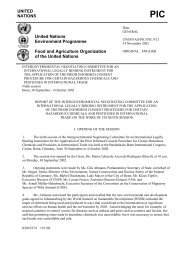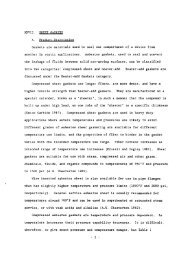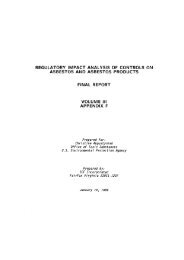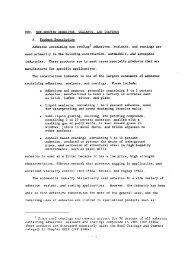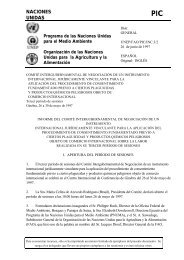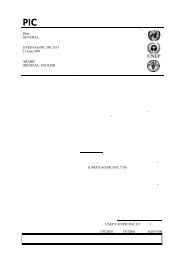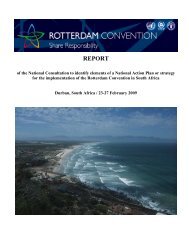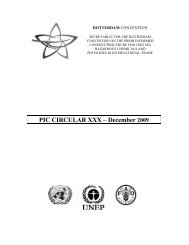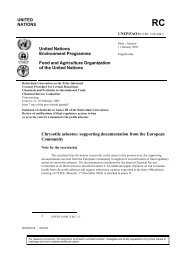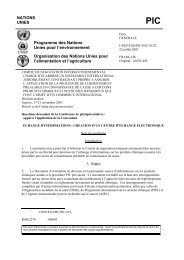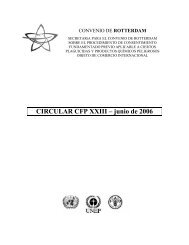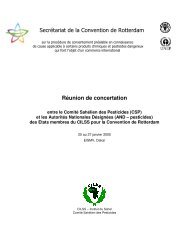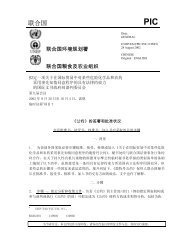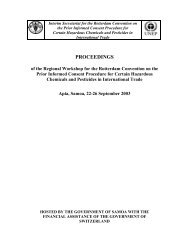Rep o rt of th e tw en - Rotterdam Convention
Rep o rt of th e tw en - Rotterdam Convention
Rep o rt of th e tw en - Rotterdam Convention
Create successful ePaper yourself
Turn your PDF publications into a flip-book with our unique Google optimized e-Paper software.
The plant protection me<strong>th</strong>ods were regulatory, cultural, mechanical and chemical. The biological<br />
and g<strong>en</strong>etic control me<strong>th</strong>ods, al<strong>th</strong>ough being used, remain to be exploited. IPM in cotton and rice<br />
has giv<strong>en</strong> good results and was expanded to cover more crops and areas. Wi<strong>th</strong> <strong>th</strong>e exception <strong>of</strong><br />
a few acres <strong>of</strong> aerial spraying over orchards in Baluchistan, all <strong>th</strong>e plant protection operations were<br />
carried out by <strong>th</strong>e private sector.<br />
The pest infestation picture was <strong>th</strong>e same as in <strong>th</strong>e previous years and <strong>th</strong>e usual control<br />
operations continued to be tak<strong>en</strong>. In <strong>th</strong>e last four years, a tree decline disease has affected mango<br />
plants in Sindh and Punjab. Mite attack on dates caused heavy losses in Baluchistan Province in<br />
<strong>th</strong>e last years. Red Palm weevil was becoming impo<strong>rt</strong>ant in Sindh. A new strain <strong>of</strong> Cotton Leaf<br />
curl virus – popularly called “burewala strain” – r<strong>en</strong>dered resistance ineffective in <strong>th</strong>e curr<strong>en</strong>t varieties.<br />
However, it was localized and was contained <strong>th</strong>rough integrated managem<strong>en</strong>t. The locust <strong>th</strong>reat<br />
was <strong>th</strong>ere, but <strong>th</strong>e situation was calm.<br />
The national IPM programme established in 2000 has executed <strong>th</strong>ree major initiatives from<br />
2000 to 2004 in an integrated strategy <strong>th</strong>rough <strong>th</strong>e Farmer Field School approach: 1) FAO-EU<br />
Regional Project “Cotton IPM Programme for Asia” (2000-2004), 2) ADB-FAO Pakistan Project<br />
“Cotton IPM Programme” (2002-2004), and 3) AGFUND-FAO Pakistan Project “Pesticide Risk<br />
Reduction for Wom<strong>en</strong> in Pakistan (pilot initiative wi<strong>th</strong>in <strong>th</strong>e FAO/EU Programme for “IPM in Cotton<br />
in Asia” (2002-2003). The programme trained 10 000 small-scale farmers by <strong>th</strong>e <strong>en</strong>d <strong>of</strong> 2004. Under<br />
<strong>th</strong>e National IPM initiative approved in July 2003 and effective in 2004, at a cost <strong>of</strong> Rs.197 million<br />
for five years, IPM was being pursued on a system-wide basis ra<strong>th</strong>er <strong>th</strong>an a commodity basis. The<br />
initiative seeks to reach 50 000 farmers by <strong>th</strong>e <strong>en</strong>d <strong>of</strong> 2009.<br />
The guidelines on <strong>th</strong>e main international standards for phytosanitary measures received from<br />
<strong>th</strong>e IPPC from time to time were considered and adopted according to <strong>th</strong>e resources available and<br />
conditions preval<strong>en</strong>t. Pakistan is committed to implem<strong>en</strong>ting <strong>th</strong>e international and regional<br />
phytosanitary standards and collaborating in <strong>th</strong>is regard at regional and international levels according<br />
to available resources. Training programmes on quarantine operations, pest risk analysis and pest<br />
eradication, and upgrading <strong>th</strong>e institutions would be highly b<strong>en</strong>eficial for string<strong>en</strong>t implem<strong>en</strong>tation<br />
<strong>of</strong> <strong>th</strong>e standards.<br />
Pesticides were registered under <strong>th</strong>e Agricultural Pesticide Ordinance 1971 read wi<strong>th</strong> <strong>th</strong>e<br />
Agricultural Pesticides (Am<strong>en</strong>dm<strong>en</strong>t) Act 1992 and 1997. No pesticide id<strong>en</strong>tified by <strong>th</strong>e <strong>Rotterdam</strong><br />
Conv<strong>en</strong>tion and Stockholm Conv<strong>en</strong>tion was registered in Pakistan and h<strong>en</strong>ce could not be used.<br />
Up to <strong>th</strong>e year 2002, 1 441 brands <strong>of</strong> pesticides and 1 004 products under g<strong>en</strong>eric names were<br />
registered. Tw<strong>en</strong>ty-<strong>th</strong>ree pesticides have be<strong>en</strong> de-registered. Fu<strong>rt</strong>her reviews took place to review<br />
<strong>th</strong>e situation. Agricultural Pesticides Rules for registration <strong>of</strong> manufacturing, formulation and repacking<br />
units were am<strong>en</strong>ded in December 2002, followed by fu<strong>rt</strong>her am<strong>en</strong>dm<strong>en</strong>ts and policy guidelines by<br />
<strong>th</strong>e Cabinet in 2004. The Pesticide Act has be<strong>en</strong> revised and was placed before Parliam<strong>en</strong>t for<br />
approval in 2005.<br />
3.15 The Philippines<br />
The Philippines, as a developing country, was faced wi<strong>th</strong> many chall<strong>en</strong>ges resulting from<br />
changes in <strong>th</strong>e international order <strong>of</strong> global trading. The most <strong>en</strong>ormous chall<strong>en</strong>ge was <strong>th</strong>e increase<br />
in trading <strong>of</strong> goods and movem<strong>en</strong>t <strong>of</strong> people which increased <strong>th</strong>e risk <strong>of</strong> pest introduction into <strong>th</strong>e<br />
country.<br />
The NPPO, <strong>th</strong>e Bureau <strong>of</strong> Plant Industry (BPI) <strong>th</strong>rough <strong>th</strong>e Plant Quarantine Service, was<br />
<strong>th</strong>e ag<strong>en</strong>cy mandated to regulate <strong>th</strong>e movem<strong>en</strong>t <strong>of</strong> plants and plant products. Regulation was<br />
implem<strong>en</strong>ted <strong>th</strong>rough legislation, regulations, administrative orders and special orders issued by <strong>th</strong>e<br />
Secretary <strong>of</strong> <strong>th</strong>e Depa<strong>rt</strong>m<strong>en</strong>t <strong>of</strong> Agriculture or <strong>th</strong>e Director <strong>of</strong> <strong>th</strong>e BPI.<br />
19



